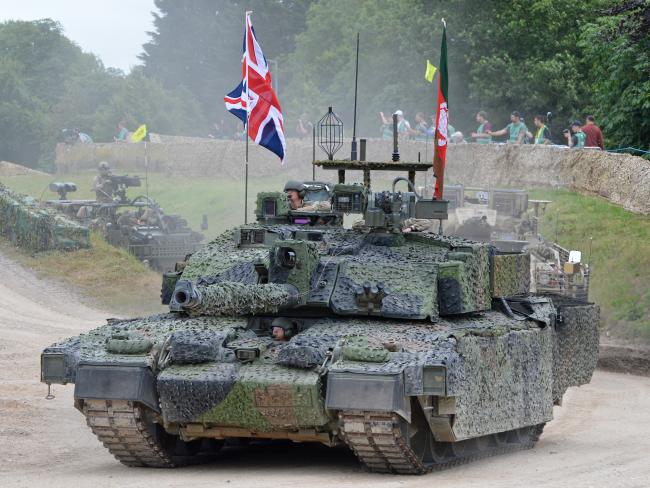
Challenger 2 tank; with which the UK now proposes to arm Ukraine. Photo Alan Wilson via Flickr (CC BY-SA 2.0)
Ukrainian President Volodymyr Zelensky stepped up efforts to further involve Britain and other NATO countries in his country’s war against Russia. This makes escalation more likely, not less.
Zelensky told the UK and EU parliaments that he’s fighting on their behalf. The prime minister Rishi Sunak said “nothing is off the table” – agreeing to send missiles and to begin training Ukrainian fighter pilots. And even though defence secretary Ben Wallace was more cautious, no one in Westminster questions the supply of arms to Ukraine.
Zelensky aims to join the EU. And next comes membership of NATO. That may not play so well – Article 5 of the treaty says armed attack against one member state is considered as an attack on all.
NATO powers have flooded Ukraine with arms, equipment and money. And now Ukraine wants long range, offensive airborne capacity. That can only lead to escalation of the conflict. Simply, Ukraine wants the ability to strike into Russian territory.
Russia’s attack on Ukraine has increased the danger of a NATO war against Russia, not removed it. Last year President Biden promised not to send “offensive equipment” to Ukraine, because it would trigger war. Yet the US, Germany and Britain are now sending modern battle tanks.
The world is in even more danger than it was at this time last year. During a recent debate at the Parliamentary Assembly of the Council of Europe, the German Foreign Minister Annalena Baerbock stated, “we are fighting a war against Russia.”
Calls for peace come from some surprising quarters. The RAND Corporation policy think tank said in January that the consequences of a long war far outweigh possible benefits.
It argued that the US should recognise that the war is likely to end through negotiations and should work to overcome impediments to starting talks. Up to now the US, and their allies including Britain, have done the opposite.
The RAND paper concludes, “…avoiding a long war is also a higher priority for the United States than facilitating significantly more Ukrainian territorial control.” That applies equally to other NATO members, Britain included, whose leaders seem oblivious to the war risks and in thrall to Ukrainian demands. An armistice or a settlement will reduce the dangers of disastrous escalation, and reduce the deaths, injuries and economic damage. That should be our demand.
Even the best settlement in Ukraine will not end the danger of war, even of nuclear war. These dangers will persist for as long as we allow imperialisms to exist, and for us here in Britain, that must mean that we get ourselves out of the NATO military alliance which emboldens aggressions by the ruling classes of the USA and Britain.
• A longer version of this article is on the web at www.cpbml.org.uk
